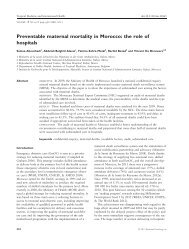Preventing Childhood Obesity - Evidence Policy and Practice.pdf
Preventing Childhood Obesity - Evidence Policy and Practice.pdf
Preventing Childhood Obesity - Evidence Policy and Practice.pdf
You also want an ePaper? Increase the reach of your titles
YUMPU automatically turns print PDFs into web optimized ePapers that Google loves.
CHAPTER 30<br />
Working with s chools<br />
Goof Buijs 1 <strong>and</strong> Sue Bowker 2<br />
1 Schools for Health in Europe Network, Netherl<strong>and</strong>s Institute for Health Promotion,<br />
Woerden, The Netherl<strong>and</strong>s<br />
2 Health Improvement Division, Department of Public Health <strong>and</strong> Health Professionals,<br />
Welsh Assembly Government, Cardiff, UK<br />
Summary <strong>and</strong> recommendations<br />
for research <strong>and</strong> practice<br />
• Dealing with obesity in schools includes promoting<br />
healthy eating, physical activity <strong>and</strong> mental health.<br />
• School-based interventions have proven moderately<br />
effective in preventing obesity, with strong evidence<br />
where a whole school approach has been adopted.<br />
• There is evidence to support the use of multi-faceted,<br />
school - based interventions to reduce obesity <strong>and</strong><br />
overweight in schoolchildren, particularly girls.<br />
• Interventions include nutrition education, physical<br />
activity promotion, reduction in sedentary behavior,<br />
behavioral therapy, teacher training, curricular<br />
material <strong>and</strong> modification of school meals <strong>and</strong> tuck<br />
shops.<br />
• The health promoting school approach offers the<br />
most suitable framework for introducing <strong>and</strong> implementing<br />
obesity - prevention programs in schools.<br />
• Action in schools on preventing obesity should be<br />
seen as part of a wider intervention framework in the<br />
school community <strong>and</strong> actively involving parents.<br />
• School-based programs on preventing obesity<br />
that include active participation of students are<br />
promising.<br />
• Better use should be made of countries ’ experiences<br />
on developing <strong>and</strong> implementing school - based programs<br />
on preventing overweight.<br />
<strong>Preventing</strong> <strong>Childhood</strong> <strong>Obesity</strong>. Edited by<br />
E. Waters, B.A. Swinburn, J.C. Seidell <strong>and</strong> R. Uauy.<br />
© 2010 Blackwell Publishing.<br />
Introduction<br />
In Europe, close to one in four school children is<br />
overweight, with numbers rapidly increasing. Similar<br />
trends are observed worldwide. There is a growing<br />
concern about the rising prevalence rates of obesity<br />
among the general population, <strong>and</strong> specifically for our<br />
younger generation. The prevention of obesity is<br />
regarded as a major public health concern both at the<br />
international <strong>and</strong> at the national level; <strong>and</strong> an integrated<br />
approach is required to halt <strong>and</strong> reverse this<br />
trend. In most policy documents on obesity (such as<br />
the 2005 European Union Green Paper on the prevention<br />
of overweight 1 <strong>and</strong> the WHO paper on the challenge<br />
of obesity in the European region 2 ) the focus is<br />
on children <strong>and</strong> young people. Schools are regarded<br />
as a key setting for health promoting interventions,<br />
<strong>and</strong> can contribute to the improvement of children ’ s<br />
health by promoting healthy eating <strong>and</strong> physical activity,<br />
by providing a suitable environment which<br />
encourages their participation <strong>and</strong> by developing their<br />
skills.<br />
This chapter describes the role schools can play in<br />
the prevention of obesity. Since the early 1990s, school<br />
health promotion has strongly evolved. Several reviews<br />
have demonstrated the effectiveness of this approach.<br />
It is now also clear that when dealing with the prevention<br />
of obesity in schools, it is not only the promotion<br />
of healthy eating <strong>and</strong> physical activity that should<br />
be included, but also aspects of mental health promotion<br />
(such as self - esteem, body image, dieting, eating<br />
disorders). But schools cannot, <strong>and</strong> do not have to, do<br />
263

















